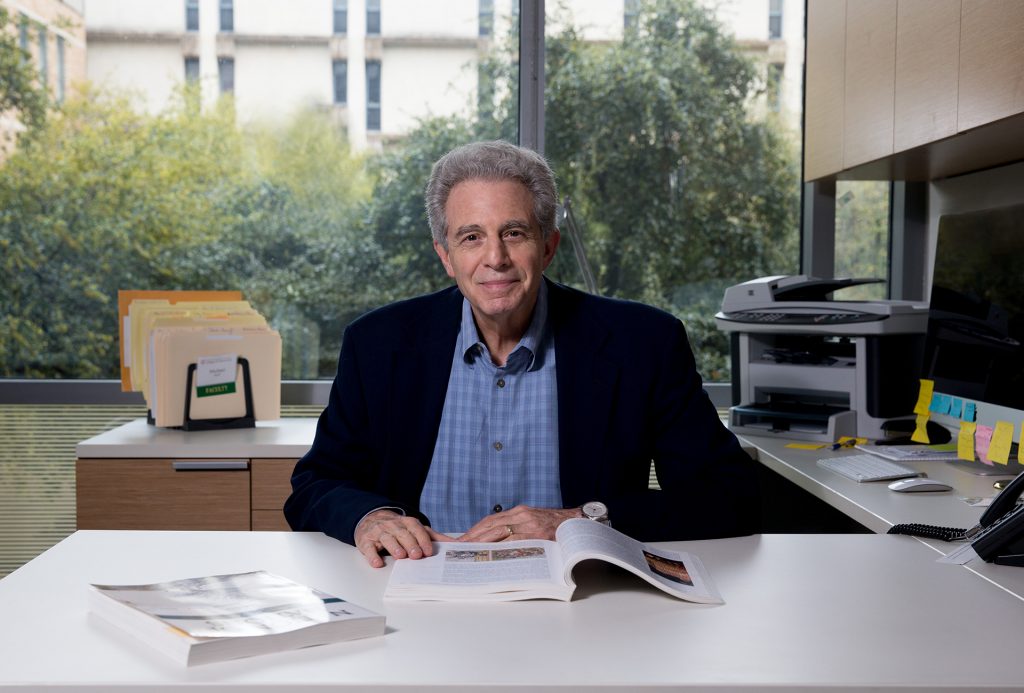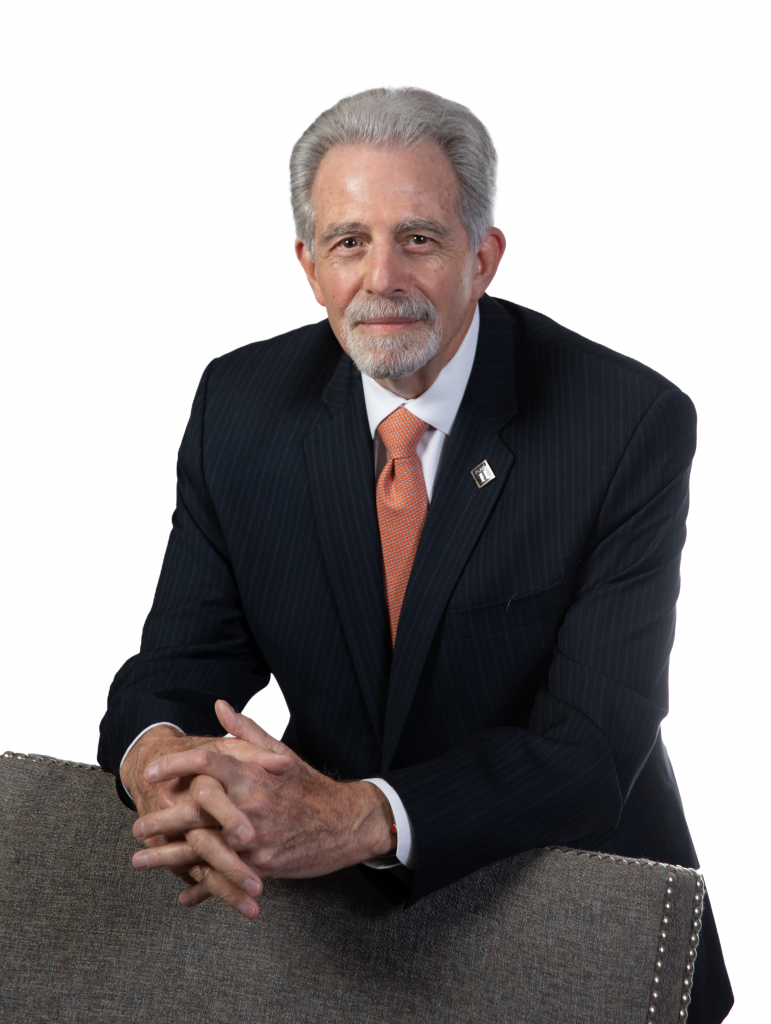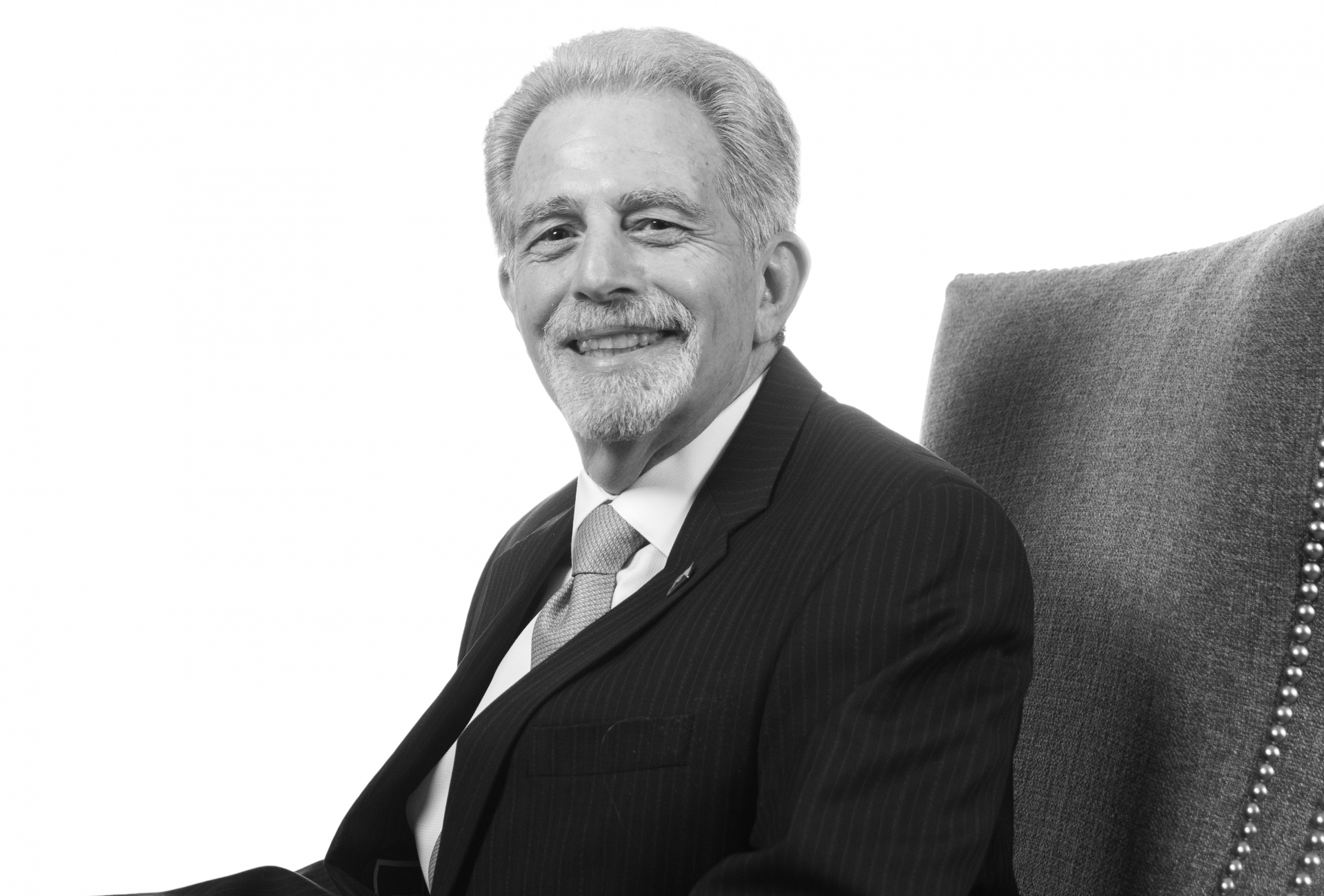Michael B. Stoff is an associate professor of history, UT Regents and University Distinguished Teaching Associate Professor and an Organization of American Historians Distinguished Lecturer. He was the director of the nationally acclaimed Plan II Honors Program at The University of Texas at Austin from 2006-2017. The Michael B. Stoff Plan II Excellence Endowment was created by students, professors and alumni in his honor. Stoff is the author of Oil, War and American Security, co-editor of The Manhattan Project: A Documentary Introduction to the Atomic Age, series co-editor of The Oxford New Narratives in American History and co-author of five American history textbooks. He has received numerous teaching awards including the Regents Outstanding Teaching Award in 2012.
Education: B.A. ’69, Rutgers College; M. Phil ’72 and Ph.D. ’77 Yale University
Hometown: Merrick, New York
How did you become interested in history?
My father was a great reader of history, especially of World War II. He volunteered for service during the Second World War, returned home to a wife and went to work. He never attended college but always loved learning. As a kid, I’d watch him reading big, thick books of history after a long day of work, among them William Shirer’s The Rise and Fall of the Third Reich and Winston Churchill’s multi-volume history of the Second World War. I wondered what was so fascinating about those books and started reading history on my own, in particular the old Landmark books on U.S. and world history. I couldn’t put them down. In the process, I discovered that history was both ironic and strange, much stranger and more unpredictable than fiction.
A second source of my interest in history came from the fact that my grandparents were immigrants who talked little about their own pasts in Europe. In some ways, pursuing history was a way to pursue my own past, to discover where I came from and to unpack the history of my family’s adopted country that became our country and thus our past.
What is the importance of learning history for 21st century students?
Learning about the past is essential for any century but particularly important as we navigate the tricky (and dangerous) rapids of the world unfolding around us. More and more, that world resembles the dystopia George Orwell described so frighteningly well in Nineteen Eighty-Four. His world, like ours, was threatened by authoritarianism and controlled by technology that turned lies into truth and truth into lies, where people were manipulated by cults of leadership and unscrupulous enablers who promised perpetual peace through unending wars. It’s in that world that one intrepid soul, Winston Smith, questions such manipulation and receives an answer that remains true today: “Who controls the past controls the future. Who controls the present controls the past.” As I tell my students, if they wish to control their future, they must understand their past.

What were some of your goals as director of the Plan II Honors program?
When I took over the Plan II Honors program in 2006, the staff and I knew we had a gem of a curriculum but we also knew that we needed to increase the diversity of our faculty and our student body. On top of that, we had two larger goals: to put Plan II students into our broader Austin community and to send them into the still broader community of the world.
Two examples of those projects are our continuing partnership with the Knowledge is Power Program (KIPP) schools of Austin and our first Plan II study-abroad courses. Beginning in my second year as director, Plan II formed a collaboration with the KIPP charter school that catered to underrepresented students by providing them with Plan II mentors who would help them to succeed and would demystify The University of Texas by bringing them onto our campus. The Plan II mentors also took a rigorous Plan II course on education for academic credit. The second goal was accomplished with two new Plan II study-abroad courses, one science-based course in Costa Rica examining environmentalism and public policy and a second, humanities-based course in Rome studying Roman culture in the early years and more recently the Papacy.
One of your areas of interest is the U.S. presidency. Has your research on this subject changed over time? And, if so, how?
For me, studying the presidency has become more personal, and I mean that quite literally. Things like friendship, love, formative psychological experiences, marriage and other personal partnerships were considered out of bounds for historians when I was a graduate student. Today, we need to know more about these things to understand how and why presidents do what they do.
What lessons do you hope your students will take away from your classes?
I want my students to understand what it was like to be another in another time and place. I want them to understand the larger implications of history by examining what I call the “Five Cs”: Cause and Consequence, Change and Continuity, and the great governor of all — Context. I want them to be able to look at the past with respect and empathy, to learn from it and through the hard-earned enterprise of reconstructing it. I want them to begin every answer to any historically minded question with, “Well, it’s complicated.”

How does the Normandy Scholar Program, which you’ve been involved with for over two decades, enhance students’ understanding of history?
The Frank Denius Normandy Scholar Program in World War II (NSP) brings together 18-20 handpicked students for an intensive semester studying the Second World War in its global, military, diplomatic and cultural contexts. Students take five courses during the spring term, then travel to Europe for an additional three-plus weeks visiting battlegrounds and memory sites.
Together we tour the Churchill War Cabinet Rooms, explore the Imperial War Museum and the Churchill Museum, spend a week in Normandy, trudging across the sands of Omaha Beach to the American Cemetery and across the Bay of the Seine to Mont St. Michel like pilgrims of old. We walk the streets of London, Paris, Warsaw, Krakow and Berlin to see cities bombed and resurrected. We pay homage to the millions killed in death camps and on battlefields. There’s nothing like being there to give students a sense of the scale of sacrifice and the searing memories of war that still mark European politics.
Finally, they understand the meaning of foreign correspondent John Hersey’s famous pronouncement, “The first postulate of the theorem of war is death.” They also understand that the second and third postulates point to the world-changing role wars play on the planet and the life changing impact they have on all involved.
What can you tell us about the book you’re currently working on?
A continuing book project revolves around the bombing of Nagasaki. Where earlier studies of the first use of atomic weapons have focused on two “why” questions (“Why did the United States employ the atomic bombs?” and “Why did Japan surrender in the face of them?”), I ask a simple question with a complex answer: What did the bombing of Nagasaki mean to those who built the weapon, those who deployed it, and those against whom it was used? I attempt to answer it from both sides of the Pacific.
Related to that project, I’ve just published a long essay, “Picturing Disaster: The Hiroshima-Nagasaki Photographs,” in a new book titled Flash of Light, Wall of Fire. The essay analyzes a series of over 100 photographs of Hiroshima and Nagasaki taken by a remarkable group of Japanese photographers in the days, months, and years after the nuclear bombing.
What are you reading about these days?
Since I read for a living, I’m always managing two or three books at a time. For work, I’m reading old memoirs of the airmen who dropped the bomb on Nagasaki and new ones by survivors of the bombing of Nagasaki. For fun, I just finished Erik Larson’s look at Churchill and his circle during the Blitz, The Splendid and the Vile. On deck is Fredrik Logevall’s new biography of Jack Kennedy. In between, I’m reading a quirky novel called The Historian by Elizabeth Kostova about a multi-generational family of historians that gets caught up in the search for Dracula. It’s a cross between an academic novel and a gothic horror tale.
Check back for more interviews with our 2020 Pro Bene Meritis recipients. The Pro Bene Meritis award is the highest honor bestowed by the College of Liberal Arts. Since 1984, the annual award has been given to alumni, faculty members and friends of the college who are committed to the liberal arts, have made outstanding contributions in professional or philanthropic pursuits or have participated in service related to the college.
